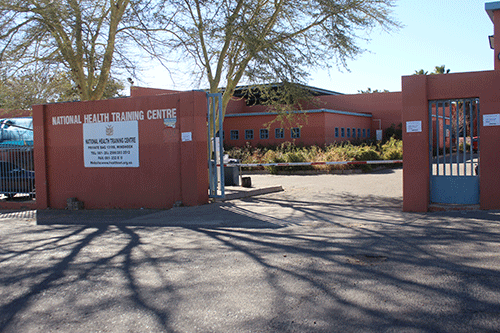Following a students’ union’s request to reopen national health training centres, executive director in the ministry of health Ben Nangombe explained why government decided to cease training and focus on promoting and protecting the health of Namibians.
The Students’ Union of Namibia (SUN) last week wrote a letter to health minister Dr Kalumbi Shangula, requesting that ministry to reopen the centres countrywide. Shangula announced the suspension of the training centres in 2019 during President Hage Geingob’s townhall meeting at Ongwediva.
These training centres are registered under the ministry of health, with campuses in Windhoek and at the Oshakati, Keetmanshoop, Otjiwarongo, Rundu and Onandjokwe hospitals.
The centres offered enrolled nursing and midwifery (the upgrading of nursing assistants); medical rehabilitation work; pharmacist’s assistance; radiographic assistance; and laboratory techniques.
SUN acting secretary general Oscar Richo Shikongo said although there was a shortage of health professionals at the time and calls by the Namibian Nurses Union (Nanu) for government to reconsider its decision to shut down the centres and instead reduce the number of students enrolled, the government went ahead to shut down all these centres without hesitation.
“Honourable minister, in 2019 the ministry of health indefinitely suspended the training of nurses at all health training centres countrywide with the lame excuse of a lack of funds.
“These unprecedented times of the devastating and deadly Covid-19 pandemic should help us to reflect and correct ourselves on the bad decisions and misplaced priorities the ministry has been overwhelmed with, whilst overlooking critical aspects of adequate staff provision and enhancing
and decentralising better healthcare services and personnel to the masses,” Shikongo charged.
SUN argued that the Covid-19 pandemic has exposed Namibia’s limping health system, with reported shortages of
healthcare workers that has left nurses overworked and at huge risk of infection due to the unbalanced ratio of treating those seeking assistance.
Nangombe said the training network of the health ministry is still operational, but only focuses on continuous education (in-service training).
He explained that shortly after Independence and in 1992 exactly, the ministry established a centre in Windhoek with the mandate to provide pre-service training for various sub-professional cadres of the ministry.
From 1996, regional health training centres were then established at Windhoek, Keetmanshoop, Rundu, Oshakati, Otjiwarongo and Onandjokwe, and these constituted the training network of the ministry. The mandate of the training network was to offer pre-service training, continuous education and information (library) services.
Courses which the training network offered under pre-service training were enrolled nursing or midwifery; pharmacist’s assistance; environmental health assistance; radiography assistance; medical rehabilitation; and laboratory techniques. “The last two courses were discontinued in 2004. The decision by the health ministry to train these cadres was due to the absence of local training institutions that could offer those courses, coupled with staff shortages at the time,” Nangombe explained.
In 2012, Cabinet approved and directed the ministry to train medical and allied health professionals at foreign academic institutions, as well as to train registered nurses at diploma level at the existing training network. The latter was to be executed through a project with a defined period of six years, after which it was expected that 1 080 registered nurses would have been trained.
Nangombe said it should be pointed out that until 2012, the University of Namibia was the only local academic institution that was offering a training programme for registered nurses. However, from 2013, new local training institutions came on board to train both registered and enrolled nurses.
“To date, three local universities offer training for registered nurses, while training for enrolled nurses is offered at four academic institutions,” he added.


